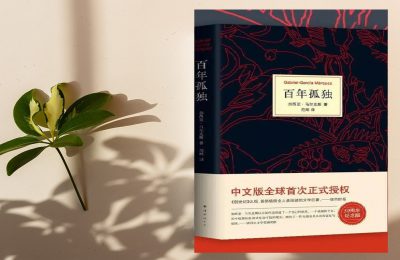《百年孤独》,是哥伦比亚作家加西亚·马尔克斯创作的长篇小说,是其代表作,也是拉丁美洲魔幻现实主义文学的代表作,被誉为“再现拉丁美洲历史社会图景的鸿篇巨著”。故事讲述马孔多小镇和布恩地亚家族的兴衰变化与传奇故事,记录了家族命运与百年历史,是重复地叙述相同而荒唐的命运,是拉美国家几百年命运的缩影,独具意味地隐喻着人类“文明”史的建立、发展与终结,在荒凉失落与荒唐可笑中诠释宿命式的轮回。家族中人物名字是相同或相近的,预示着他们拥有殊途同归的孤独命运。《百年孤独》以布恩地亚被捆在树上为开端,以他被蚂蚁吃掉为结束,通过细腻丰富的笔触、大胆自由的想象、魔幻的叙事艺术,讲述布恩地亚家族命运与历史,刻画人物孤独的灵魂与自我救赎,进而体现出个人、家族及全人类的悲悯与孤独情怀,让人们重新思考时代发展与人性变化。《百年孤独》被世界文坛誉为魔幻现实主义文学的主峰,已被翻译成30多种文字出版,销量逾1000万册。
Chapter 3
PILAR TERNERA’S son was brought to his grand parents?house two weeks after he was born. ?rsula admitted him grudgingly, conquered once more by the obstinacy of her husband, who could not tolerate the idea that an offshoot of his blood should be adrift, but he imposed the condition that the child should never know his true identity. Although he was given the name Jos?Arcadio, they ended up calling him simply Arcadio so as to avoid confusion. At that time there was so much activity in the town and so much bustle in the house that the care of the children was relegated to a secondary level. They were put in the care of Visitación, a Guajiro Indian woman who had arrived in town with a brother in flight from a plague of insomnia that had been scourging their tribe for several years. They were both so docile and willing to help that ?rsula took them on to help her with her household chores. That was how Arcadio and Amaranta came to speak the Guajiro language before Spanish, and they learned to drink lizard broth and eat spider eggs without ?rsula’s knowing it, for she was too busy with a promising business in candy animals. Macondo had changed. The people who had come with ?rsula spread the news of the good quality of its soil and its privileged position with respect to the swamp, so that from the narrow village of past times it changed into an active town with stores and workshops and a permanent commercial route over which the first Arabs arrived with their baggy pants and rings in their ears, swapping glass beads for macaws. Jos?Arcadio Buendía did not have a moment’s rest. Fascinated by an immediate reality that came to be more fantastic than the vast universe of his imagination, he lost all interest in the alchemist’s laboratory, put to rest the material that had become attenuated with months of manipulation, and went back to being the enterprising man of earlier days when he had decided upon the layout of the streets and the location of the new houses so that no one would enjoy privileges that everyone did not have. He acquired such authority among the new arrivals that foundations were not laid or walls built without his being consulted, and it was decided that he should be the one in charge of the distribution of the land. When the acrobat gypsies returned, with their vagabond carnival transformed now into a gigantic organization of games of luck and chance, they were received with great joy, for it was thought that Jos?Arcadio would be coming back with them. But Jos?Arcadio did not return, nor did they come with the snake-man, who, according to what ?rsula thought, was the only one who could tell them about their son, so the gypsies were not allowed to camp in town or set foot in it in the future, for they were considered the bearers of concupiscence and perversion. Jos?Arcadio Buendía, however, was explicit in maintaining that the old tribe of Melquíades, who had contributed so much to the growth of the village with his age-old wisdom and his fabulous inventions, would always find the gates open. But Melquíades?tribe, according to what the wanderers said, had been wiped off the face of the earth because they had gone beyond the limits of human knowledge.
